- Home
- The Winter Garden
- Cones and Seedpods
Cones and Seedpods are
Natural Decorations in Your
Winter Landscape
Cones, seedpods, dried flowerheads, and dried capsules make intriguing decorations for your winter garden; and it's nice to have your own plant materials on hand to make holiday ornaments and decorations. Of course, many do double duty--beauty for your winter landscape, and food for birds and other wildlife.
Cones
Abies concolor, white fir, Zones 4-7
Abies fraseri, Fraser fir, Zones 4-7
Calocedrus decurrens, California incensecedar, Zones 5-8
Cedrus atlantica 'Glauca,' blue Atlas cedar, Zones 6-9
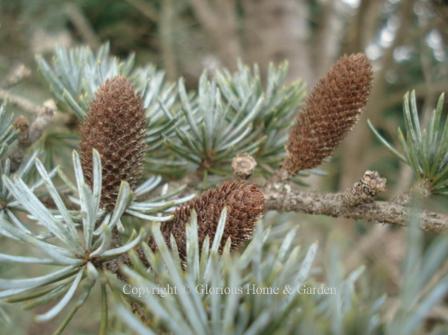 Cedrus atlantica 'Glauca'
Cedrus atlantica 'Glauca'Cedrus deodara, Deodar cedar, Zones 7-8
Cedrus libani, cedar of Lebanon, Zones 5-7
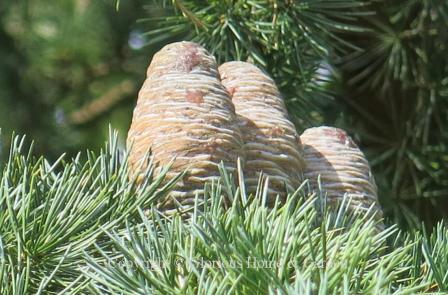 Cedrus libani ssp. atlantica 'Glauca'
Cedrus libani ssp. atlantica 'Glauca'Chamaecyparis lawsoniana, Lawson falsecypress, Zones 5-7
Chamaecyparis thyoides, Atlantic whitecedar, Zones 4-8
Cryptomeria japonica, Japanese cryptomeria, Zones 5-8
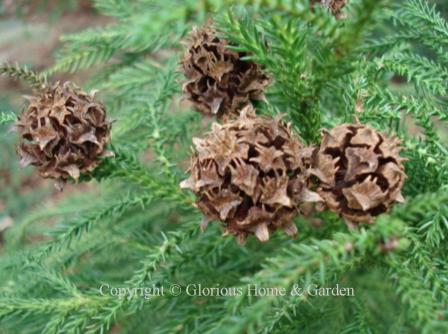 Cryptomeria japonica cone
Cryptomeria japonica coneHydrangea paniculata 'Little Lime,' panicle hydrangea, Zones 3-8. The persistent seedheads turn brown in autumn and add winter interest to the garden.
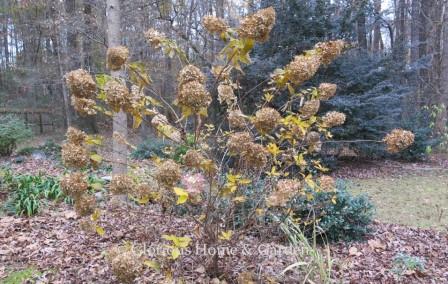 Hydrangea paniculata 'Little Lime,' panicle hydrangea
Hydrangea paniculata 'Little Lime,' panicle hydrangeaJuniperus chinensis, Chinese juniper, Zones 4-9
Juniperus communis, common juniper, Zones 2-6
Juniperus conferta, shore juniper, Zones 6-9
Juniperus scopulorum, Rocky Mountain juniper, Zones 3b-7
Juniperus virginiana, Eastern redcedar, Zones 3b-9
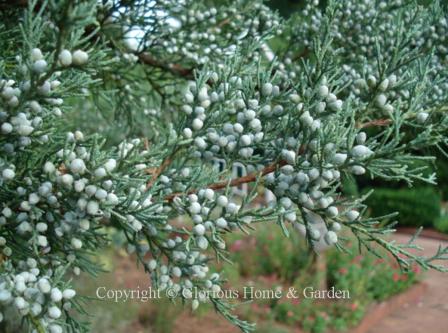 Juniperus virginiana
Juniperus virginianaLarix kaempferi, Japanese larch, Zones 4-7.
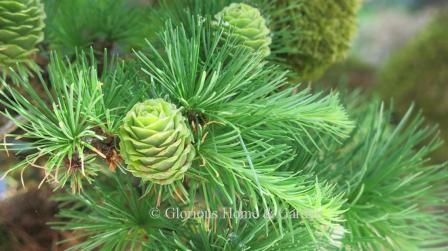 Larix kaempferi cones
Larix kaempferi conesPicea glauca, white spruce, Zones 2-6
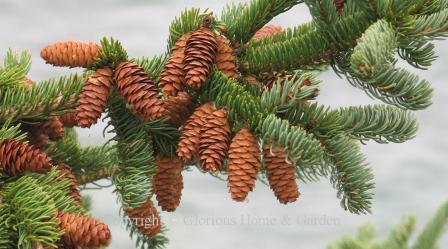 Picea glauca
Picea glaucaPicea pungens, Colorado spruce, Zones 3-7
Pinus bungeana, lacebark pine, Zones 5-7b
Pinus densiflora, Japanese red pine, Zones 3b-7
Pinus flexilis, limber pine, Zones 4-7
Pinus koraiensis, Korean pine, Zones 4-7
Pinus nigra, Austrian pine, Zones 3b-7
Pinus parviflora, Japanese white pine, Zones 4-7
Pinus strobus, Eastern white pine, Zones 3-7
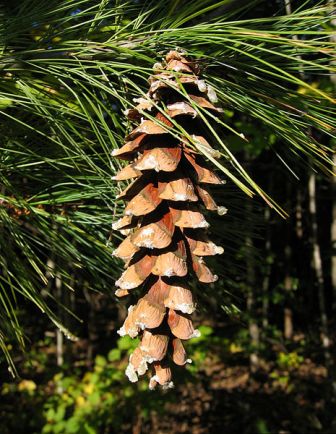 Pinus strobus Keith Kanoti, Maine Forest Service, USA.
Pinus strobus Keith Kanoti, Maine Forest Service, USA.Pinus sylvestris, Scotch pine, Zones 3-7
Pseudotsuga menziesii, Douglas fir, Zones 4-6
Tsuga canadensis ‘Sargentii,’ Canadian hemlock, Zones 3b-7. ‘Sargentii’ is a weeping form of Canadian hemlock decorated in winter with small brown cones, often harvested for holiday decorations.
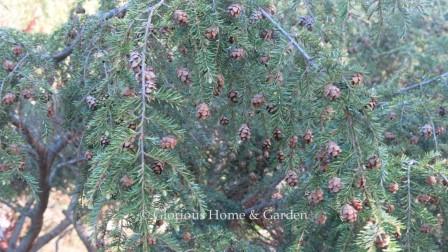 Tsuga canadensis ‘Sargentii,’ Canadian hemlock
Tsuga canadensis ‘Sargentii,’ Canadian hemlockTsuga caroliniana, Carolina hemlock, Zones 4-7
Tsuga sieboldii, Southern Japanese hemlock, Zones 6a-8b.
Seedpods, dried capsules and dried flowerheads
Callistemon citrinus, lemon bottlebrush, Zones 8b-11—shrub, persistent seed capsules
Calycanthus floridus, sweetshrub, Zones 4-9—shrub, interesting large brown seedpods
Cercis canadensis, Eastern redbud, Zones 4-9—tree, long pea-like pod persists into winter
Clethra alnifolia, summersweet, Zones 4-9—shrub, seed capsules persist through winter
Gardenia jasminoides, gardenia, Zones 7b-10--shrub, intriguingly decorative orange seed capsules produced in autumn that persist into winter.
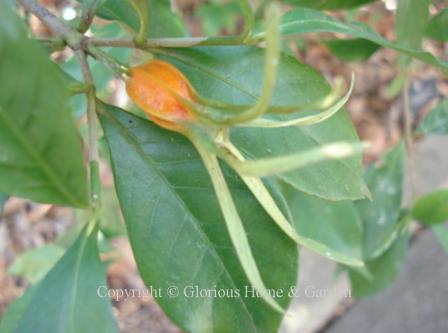 Gardenia jasminoides seed capsule
Gardenia jasminoides seed capsuleHydrangea macrophylla, bigleaf hydrangea, Zones 6-9—shrub, flowerheads of the mophead and lacecap varieties often dry on the plant and be left for winter effect and cut off in late winter or early spring as new growth appears. Be careful how you prune so as not to remove buds for new blooms.
Hypericum prolificum, shrubby St. John’s wort, Zones 4-8—shrub, dried seed capsules persist through winter.
Kalmia latifolia, mountain laurel, Zones 4-9—shrub.
Lagerstroemia indica, crape myrtle, Zones 7-9, shrub or small tree, dried capsules persist through winter. Prune off in late winter before new growth begins.
Oxydendrum arboreum, sourwood, Zones 5-9—tree, fingerlike panicles of dried capsules linger after blooming looking almost like the tree is still in flower.
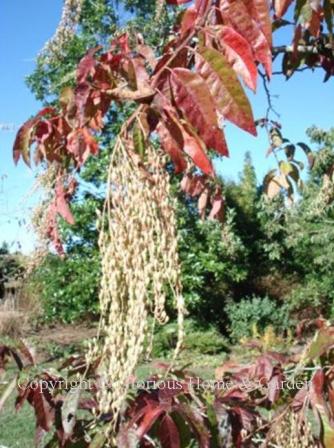 Oxydendrum arboreum
Oxydendrum arboreumPieris japonica, Japanese pieris, Zones 5-7—shrub, bell-shaped flowers in panicles become dried capsules that linger
Platycarya strobilacea, Zones 6-8. I was struck by this unusual hickory relative during a visit to the Sarah P. Duke Garden in Durham, N.C. The dark cone-like seed capsules stood erect and contrasted boldly with the compound leaves. Very eye-catching.
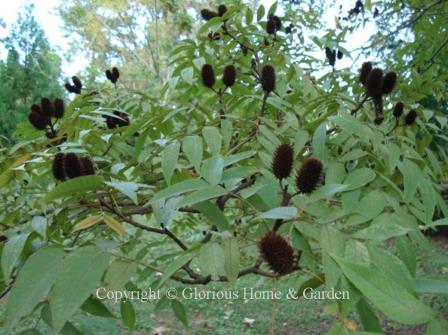 Platycarya strobilacea
Platycarya strobilaceaStewartia monadelpha, tall stewartia, Zones 6-8. I love the beautiful bark of this tree, but it also produces little 5-part nut-like seed capsules in the autumn.
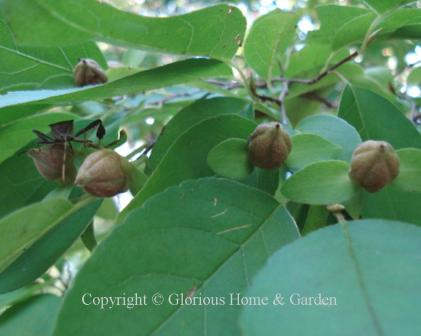 Stewartia monadelpha
Stewartia monadelphaPlant of the Month

Daphne odora
'Mae-jima'
Updated new USDA Plant Hardiness Zone Map 2023.